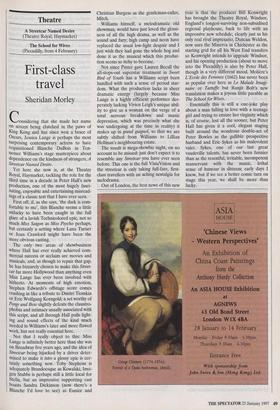Theatre
A Streetcar Named Desire (Theatre Royal, Haymarket)
The School for Wives (Piccadilly, from 4 February)
First-class travel
Sheridan Morley
Considering that she made her name on screen being clutched in the paws of King Kong and has since won a brace of Oscars, Jessica Lange is perhaps the most surprising contemporary actress to have requisitioned Blanche DuBois in Ten- nessee Williams's stage masterpiece about dependence on the kindness of strangers, A Streetcar Named Desire.
Yet here she now is, at the Theatre Royal, Haymarket, tackling the role for the third time in a decade in Peter Hall's new Production, one of the most hugely fasci- nating, enjoyable and entertaining misread- ings of a classic text that I have ever seen.
First off, if, as she says, 'the dark is com- fortable to me', this Blanche seems a little unlucky to have been caught in the full glare of a lavish Technicolored epic, not so much Miss Saigon as Miss Psycho perhaps, but certainly a setting where Lana Turner or Joan Crawford might have been the more obvious casting.
The only two areas of showbusiness where Hall has ever really achieved com- mercial success or acclaim are movies and musicals, and, as though to repair that gap, he has bizzarely chosen to make this Street- car far more Hollywood than anything even Miss Lange has ever been involved with hitherto. At moments of high emotion, Stephen Edwards's offstage score comes crashing in like a tribute to Dmitri Tiomkin or Eric Wolfgang Korngold; a set worthy of Porgy and Bess slightly defeats the claustro- phobia and intimacy usually associated with this script, and all through Hall pulls light- ing and sound effects of the kind much needed in Williams's later and more flawed work, but not really essential here.
Not that I really object to this: Miss Lange is infinitely better here than she was on Broadway five years ago, and the idea of Streetcar being hijacked by a driver deter- mined to make it into a glossy epic is cer- tainly something new. Toby Stephens is adequately Brandoesque as Kowalski, Imo- gen Stubbs is perhaps still a little local for Stella, but an impressive supporting cast boasts Sandra Dickinson (now there's a Blanche I'd love to see) as Eunice and Christian Burgess as the gentleman-caller, Mitch.
Williams himself, a melodramatic old showman, would have just loved the glossi- ness of all the high drama, as well as the sound and fury; high camp and neon have replaced the usual low-light despair and I just wish they had gone the whole hog and done it as the musical which this produc- tion seems so itchy to become.
Not since Pinter gave Lauren Becall the all-stops-out superstar treatment in Sweet Bird of Youth has a Williams script been handled with such a sense of period star- dom. What the production lacks in sheer dramatic energy (largely because Miss Lange is a highly efficient performer des- perately lacking Vivien Leigh's unique abil- ity to give us a woman on the verge of a total nervous breakdown and manic depression, which was precisely what she was undergoing at the time in reality) it makes up in grand guignol, so that we are subtly shifted from Williams to Lillian Hellman's neighbouring estate.
The result is mega-showbiz night, on no account to be missed: just don't expect it to resemble any Streetcar you have ever seen before. This one is the full VistaVision and the streetcar is only taking full-fare, first- class travellers with an aching nostalgia for melodrama.
Out of London, the best news of this new year is that the producer Bill Kenwright has brought the Theatre Royal, Windsor, England's longest-surviving non-subsidised regional playhouse, back to life with an impressive new schedule; clearly just as his only real rival impresario, Duncan Weldon, now uses the Minerva in Chichester as the starting grid for all his West End transfers so Kenwright intends to upgrade Windsor, and his opening production (about to move into the Piccadilly) is also by Peter Hall, though in a very different mood. Moliere's L'Ecole des Femmes (1662) has never been as popular over here as Le Malade Imagi- naire or Tartuffe but Ranjit Bolt's new translation makes a joyous little parable as The School for Wives.
Essentially this is still a one-joke play about a man falling in love with a teenage girl and trying to ensure her virginity which is, of course, lost all the sooner, but Peter Hall has given it a cool, elegant staging built around the wondrous double-act of Peter Bowles as the gullible prospective husband and Eric Sykes as his malevolent valet. Sykes, one of our last great vaudeville talents, has never been funnier than as the resentful, irritable, incompetent manservant with the manic, lethal sense of humour in distress; early days I know, but if we see a better comic turn on stage this year, we shall be more than lucky.


































































 Previous page
Previous page